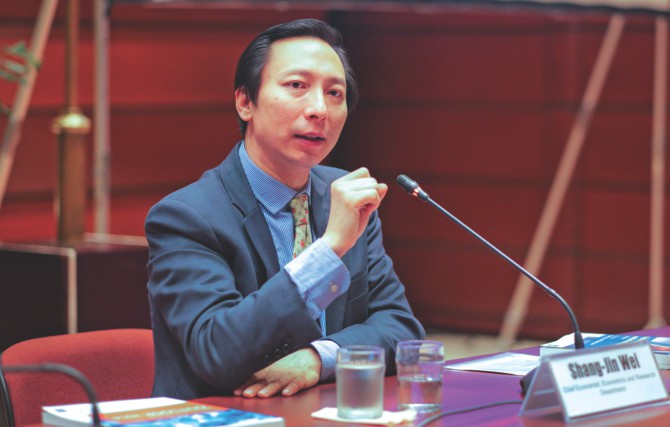ADB chief economist stresses the need to reduce logistic costs for businesses
The Asian Development Bank predicts high economic growth for Bangladesh because of the country’s continuing improvements in political and business environment, said its chief economist Shang-Jin Wei.
“We are expecting better days for the Bangladesh economy as the country’s exports are increasing due to a rebound in the global economy,” he said.
Growth of exports is expected to rise to 13 percent, up from 12 percent in the previous year, according to ADB’s latest Outlook Update Report.
Improved overseas sales will obviously elevate the economy as Bangladesh is pursuing an export-led growth strategy, he told The Daily Star at the ADB headquarters in the Philippines recently.
The US and European economies are gaining momentum in recent times, which will help Bangladesh grab more export orders from those markets, he said.
The Manila-based development partner has already made an upward revision to its economic growth forecast for Bangladesh to 6.4 percent from 6.2 percent for the current fiscal year.
All major economic indicators of Bangladesh have been showing signs of improvement in the past months, according to the ADB report.
The report also projected a current account surplus, and inflation will remain within the government’s target.
Bangladesh witnessed a slowdown in economic activities for more than a year on account of the national elections held in January this year.
Even after the elections, businesses took time to bounce back and regain confidence.
Private sector credit growth went down to a 13-year low of 10.4 percent in February. But things started taking a U-turn since then and the growth rose to 12.3 percent in June.
“As economic reforms took effect and despite political disruption prior to the national elections, growth and exports beat projections,” according to the report.
Bangladesh’s exports rose 7.25 percent year-on-year to $2.15 billion in August, riding on the back of a rebound in garment shipments.
Export earnings increased almost 2 percent year-on-year in the first two months of the fiscal year to $5.14 billion, according to the Export Promotion Bureau.
The export target of $33.2 billion for fiscal 2014-15 is 10 percent higher than that of last fiscal year’s actual receipts.
Bangladesh—the second largest apparel exporter after China—should focus on reducing logistic costs to increase overseas sales, said Wei, who took charge of the chief economist of ADB in August.
Labour costs are comparatively low in Bangladesh, but its logistic costs are high, he said. “So, the country should address the issue by increasing investment in infrastructure.”
The Chinese born US national has a long and distinguished career in academia and international finance and trade.
Before joining ADB, he was the NT Wang chair and director of the Chazen Institute of International Business at Columbia University.
Prior to that, he was an assistant director and chief of division at the International Monetary Fund. He was also the IMF chief of mission to Myanmar in 2004.
Wei, who holds a PhD in economics and masters in finance from the University of California in the US, said stability of macroeconomic indices is a key factor for higher economic growth.
The ADB said average inflation will come down to 6.5 percent this year from 7.4 percent in the previous year, mainly due to easing supply constraints, a better crop outlook, large stock of food grains and a supportive monetary policy.
It said low food prices in the international market and stable oil prices will contribute to a fall in the inflation rate.
Imports are also projected to be higher at 15 percent in 2014-15, higher from 8.9 percent in the previous year.
The inflow of remittance, which declined 1.6 percent last fiscal year, is projected to increase 7 percent in the current year.
The country’s investment has remained virtually stagnant between 25 and 26 percent of GDP over several years in the past. Analysts said investment needs to be raised to at least 32 percent to achieve 7 percent or more economic growth.
Macroeconomic indicators are slightly better in Bangladesh, but still there is room for improvement, the economist said.
Wei said ADB is ready to work with the Bangladesh government to bring reforms to the economy.
Source: The Daily Star

